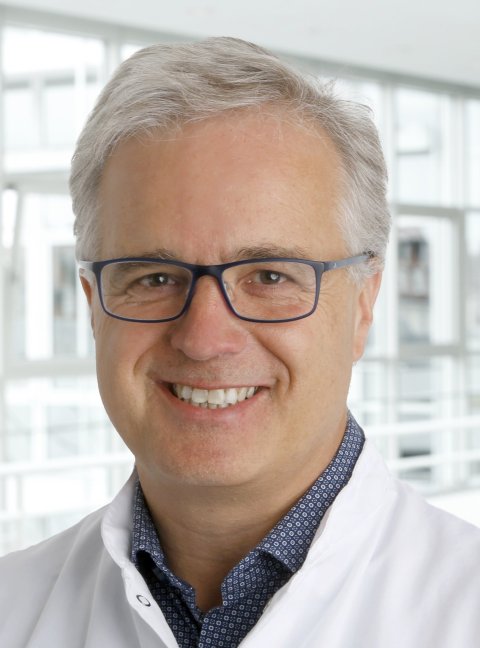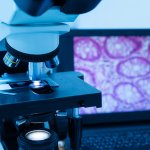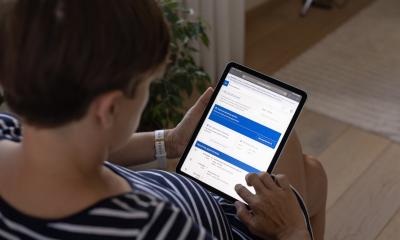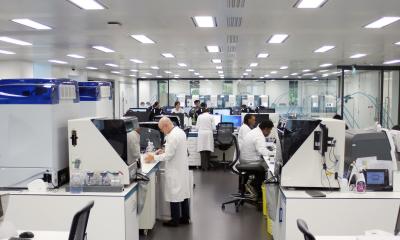© Constanze Tillmann/Messe Düsseldorf
News • Tradefair programme overview
Don't miss: Hot issues, current trends and innovations at the Medica 2024 Labmed Forum
Skills shortages and digitalization, trends in cardiology and oncology, future prospects in laboratory medicine, and healthy aging – these pressing topics are at the forefront of discussions at this year’s Medica Labmed Forum (in Hall 1 / G 37).
What are the most exciting developments in medicine at the moment? The specialist forums at Medica in Düsseldorf once again provide in-depth insights into this topic with their stage programme during this year‘s trade fair (11 – 14 November), for example on health IT, medical technology trends, healthcare policy or laboratory medicine. The Medica Labmed Forum has become one of the main attractions of the tradefair's supporting programme in recent years with its informative short presentations and expert panel discussions.

Image source: German Heart Center Munich
Under the buzzword “Laboratory 4.0”, a trend towards massive digitalization and networking as well as big data applications and artificial intelligence (AI) is currently emerging in laboratory diagnostics, says the Scientific Director of the Media Labmed Forum, Prof. Stefan Holdenrieder from the German Heart Center Munich, with a view to this year‘s focus. „So far, we have mainly looked at individual laboratory values. In the future, we will analyze increasingly complex data patterns with machine learning and combine them into complex diagnostic scores. Laboratory medicine is currently evolving from pure analytics towards data science. Interdisciplinary collaboration between laboratory experts and specialized data scientists, especially computer scientists and biostatisticians, is becoming increasingly important.“
Day 1: Skills shortage and digitalization
The Medica Labmed Forum, chaired by Prof. Dr. Thomas Streichert, University Hospital Cologne, will address the highly topical issues of digitalization and AI on the opening day (11 November) of Medica 2024. The morning session will focus on the shortage of skilled workers, which, according to current surveys, is the most pressing problem in laboratory medicine. Dr. Ronald Biemann from Leipzig University Hospital, head of the Young Laboratory Section of the German Society for Clinical Chemistry and Laboratory Medicine (DGKL), will report on the sometimes dramatic shortage of young professionals in the medical and medical-technical field. In the panel discussion, the speakers will look for ways out of the crisis with the help of automation and digitalization.
In the afternoon, the focus will be on AI and big data tools that are already available and those still in development. Image recognition using deep learning is already state of the art in the automated evaluation of differential blood images, while machine learning from large multivariate data sets, such as those generated every day in laboratory diagnostics, is still in the development stage. The exciting question of how large language models (LLM) can help to make abstract laboratory findings more comprehensible and whether AI really makes us smarter (or possibly dumber) will also be discussed.
Recommended article

News • Tailored chatbot
Customized ChatGPT to advance digital pathology
New research shows that the AI large language model ChatGPT can be tailored to provide accurate responses to questions about digital pathology and compile detailed results.
Day 2: Trends in cardiology and oncology
Traditionally, on the second day of the fair, Prof. Stefan Holdenrieder will discuss current developments in laboratory medicine for the two disease complexes that determine mortality in the western world: Cardiovascular diseases and cancer. In cardiology, the focus this year is on congenital heart defects. They can increasingly be corrected surgically in childhood and are also playing an ever greater role in adult medicine due to improved life expectancy. The speakers from the German Heart Center and the Technical University of Munich will shed light on the topic from a clinical perspective, and mathematician Prof. Frank Klawonn from the Helmholtz Zentrum Braunschweig will demonstrate the possibilities of modern data analysis using machine learning as a guest scientist at the Heart Center.
The afternoon programme is dedicated to highly sensitive blood-based cancer diagnostics. With this examination technique, known as “liquid biopsy”, laboratory medicine is opening up completely new ways in oncology to monitor tumour progression more closely than is possible with conventional tissue biopsies. This makes it possible to recognize at an earlier stage when a treated cancer will flare up again, making a change in therapy necessary. New methodological approaches such as the analysis of methylation profiles for the early detection of hereditary forms of cancer or single cell analysis using microfluidics are being discussed.
Recommended article

Article • Pros and cons of diagnostic techniques
Liquid biopsy vs. tissue biopsy: Getting the best of both worlds
Tissue biopsy and liquid biopsy can increasingly be used as complementary or alternative approaches, with advantages and limitations to each. While speakers at the recent 35th European Congress of Pathology in Dublin were quick to highlight that liquid biopsy was not about to replace tissue biopsy, the focus looked at the benefits and challenges of each through the lens of four expert speakers.
Day 3: Future perspectives of laboratory medicine
On the “Young Scientists Day” of the forum, young scientists will present their views on the future of laboratory medicine. As an introduction, the session leader, PD Dr. Verena Haselmann from the University Hospital Mannheim, will give an overview of the latest advances in the field and the obstacles that need to be overcome. New opportunities include, e.g., wearables for the continuous recording of diagnostic parameters, while obstacles include new quality requirements and the shortage of specialists. In the afternoon, the discussion will revolve around personalized therapies based on individual laboratory value patterns, the interdisciplinary interaction of laboratory and imaging in integrated diagnostics and the use of AI.
© Constanze Tillmann/Messe Düsseldorf
Day 4: Healthy ageing
The final day of the forum is traditionally dedicated to diagnostic research institutes and companies that want to open the door to new areas of application for laboratory medicine. The two sessions will be led by members of the Association of German Diagnostic Manufacturers VDGH, Dr. Kai Prager and Dr. Peter Quick. They have chosen research into ageing from the perspective of pathophysiology, diagnostics and therapy as the topic for 2024. Discussions will include the latest findings on the genetic and epigenetic life clock, protein misfolding and aggregation as the basis of neurodegenerative diseases such as Alzheimer‘s and Parkinson‘s and the role of the intestinal microbiota in stroke.
For the “finale” in the afternoon, interesting theories and practical experiences will be discussed on how the ageing process can be slowed down. Prof. Dr. Emrah Düzel, University of Magedeburg, will present various anti-ageing drugs, Prof. Dr. Wolfram Ruf from the University of Mainz will explain the influence of anti-inflammatory agents, Prof. Dres. Monique Breteler from the German Center for Neurodegenerative Diseases (DZNE) will talk about the influence of the environment on the ageing of the central nervous system, and Prof. Dr. Claire Jacob, also from the University of Mainz, will discuss ways of repairing lesions in the nervous system.
Source: Messe Düsseldorf
08.11.2024





